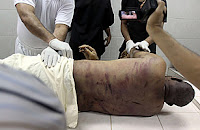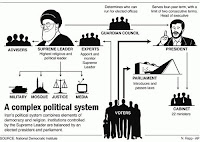Bahrain's apartheid

Harrowing testimony of torture, intimidation and humiliation from a doctor arrested in the crackdown on medical staff in Bahrain has revealed the lengths to which the regime's security forces are prepared to go to quash pro-democracy protests. Interviews obtained by newspapers and reporters from inside Bahrain tell of ransacked hospitals and of terrified medical staff beaten, interrogated and forced into signing false confessions. Many have been detained, their fate unknown.
Inspired by the pro-democracy protests which swept Tunisia and Egypt earlier this year, Bahrainis took to the streets in their thousands in February, demanding greater political rights and more equality for the overwhelming 4/5 ratio of Shia Muslim majority, ruled over for decades of a British and US supported Sunni monarchy. Saudi Arabia invaded this more or less mini aphartheid and helped the state launch a fierce counter-offensive in mid-March, swiftly and brutally crushing the uprising by killing, arresting, raping destroying everything and everyone in their way, enjoying the privelege of the USA and Britain looking the other way. .
The campaign of intimidation against the doctors and nurses who bore witness to the bloody crackdown began two months ago at Salmaniya Medical Complex, the main hospital in the capital Manama. It has since been extended to at least nine health centers which have been systematically attacked by the the so called imported security forces over the past month, an activist cataloging the abuses says. Each incident follows the same pattern: cars with people in police uniforms in jeeps surround the center, before armed men and women in masks close the gates and line all those caught inside up against the wall.
Their previously non existent and suddenly imported Police dogs are also used to spread fear among the staff. The accounts, correspond with others emerging from Bahrain and from reports by international monitoring groups. The latest crackdown followed protests by doctors at the refusal by the regime to allow ambulances from Salmaniya Hospital to attend to those injured in the protests. Details of the assaults, collected by the families of those detained and passed to reporters, show that at least 40 medical staff were arrested in nine health centers between 10 April and 27 April. Dr Ahmed Jamal, president of the Bahrain Medical Society, was arrested at his clinic on 2 May.
Among 11 female doctors and nurses arrested, eight were released on 4 May but three remain detained, including Rula Jasim al-Saffar, 49, president of the Bahrain Nursing Society who has been held in custody for five weeks. One consultant and family physician described in an email how she had been beaten, abused and humiliated and left with a black eye and bruises on her back during a seven-hour detention at the Central Province Police center. Fearing for the safety of her children, she asked to remain anonymous.
She was sworn at, called a "dirty Shia" and a "whore", beaten with a thick hose and forced to sing the national anthem, she said. At one point she was blindfolded and made to run down a corridor until she banged into a wall. Her assailants alleged she had protested against the regime, and hit her when she denied it. She was released after signing a document admitting she had protested against the Health Minister.
The doctor believes she was targeted because she is the wife of a prominent surgeon who has been held in custody since being arrested in mid-operation more than a month ago "While I thank God I have been reunited with my children, I am even more fearful for the well-being of my husband, knowing the torture that I endured," she wrote.
She said that another female doctor detained with her had been unable to sing the national anthem when ordered to do so because her throat was too dry. "The interrogators gave her a tiny sip of water and told her to stick out her tongue. She was blindfolded and when she put her tongue out, one of the officers suddenly stabbed it with a pen. Then they told her to sit on a chair because she felt dizzy.
"When she went to sit, they pulled the chair away and she fell to the ground. Then they threw the chair at her and it landed on top of head. They told her not to remove the chair from her head." Relatives of those detained said some were forced to confess to acts they had not committed, with those confessions filmed by the security forces for subsequent broadcast. The daughter of one doctor said: "They were made to confess that they gave treatment only to Shia protesters and not to Sunnis, stole blood from the hospital to splatter on protesters to make the situation seem more dramatic, and that they encouraged others to protest against the regime."
Rights activists say medical officials have been targeted because they bore witness to the terrible injuries sustained by the protesters they treated, and could therefore give evidence against the government. Forty-seven doctors and nurses were charged last week with "promoting efforts to bring down the government" and "harming the public by spreading false news". Their trials are expected to begin shortly. Vivienne Nathanson, head of ethics at the British Medical Association, said the attacks on medical staff in Bahrain were unprecedented.
"I don't think we have seen it on this scale before. It is very worrying because doctors and health workers have an ethical duty to treat people regardless of what they have been doing and the state has an obligation to protect them. All the doctors have been doing is saying these people need care and they have got to give care. They are not saying the protesters are right," she said. Lord Eric Avebury, a Liberal Democrat peer and expert on Bahrain, condemned the British Government's response to the crisis, and called for sanctions against the Sunni government and the ruling family of King Hamad bin Isa al-Khalifa. "The Foreign Secretary has made some pretty anodyne statements that are not commensurate with the scale of the problem. The whole medical and nursing profession, journalists and all Shia professionals including MPs have been targeted," he said.
"I would like to see a ban on entry to the UK of some of the leading perpetrators of the Khalifa family and the sequestration of their assets. "These are crimes against humanity which I hope will be subject to criminal proceedings and their assets used to compensate the victims, subject to court proceedings." This article was printed in The Independent.



Comments